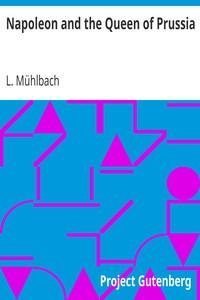|
|
Read this ebook for free! No credit card needed, absolutely nothing to pay.Words: 169183 in 59 pages
This is an ebook sharing website. You can read the uploaded ebooks for free here. No credit cards needed, nothing to pay. If you want to own a digital copy of the ebook, or want to read offline with your favorite ebook-reader, then you can choose to buy and download the ebook.

: Napoleon and the Queen of Prussia by M Hlbach L Luise Jordan F Translator - Napoleon I Emperor of the French 1769-1821 Fiction; Luise Queen consort of Frederick William III King of Prussia 1776-1810 Fiction; Prussia (Germany) History Frederick William III@FreeBooksTue 06 Jun, 2023 PAGE INTRODUCTION 5 INTRODUCTION A study of type founding and of the development of presses and other printers' machinery in America presents many interesting considerations. If the attempt were made to give in detail the story of American type founding and the accomplishments of the notable American type founders, and at the same time to chronicle the improvements and inventions which American genius has contributed to the machines and processes used in printing and the allied industries, a very large book might readily be produced. While such a book would not be without interest and would certainly have very great value, it would be valuable mainly as a work of reference and would lack the interest which ought to attach to a book of the sort contained in this series. It has seemed to the writer best, therefore, not to attempt to collect an encyclopedia of information, but to give a brief sketch of the development of types and presses in the United States, with a special view to the beginnings in both departments. It is greatly to be hoped that a more competent hand may later be set to the production of such an encyclopedic volume as has been indicated, but such a work does not belong in this series. In these matters, as in so many others, we find a definite course of development going on. Originally American dependence upon Europe was complete. The political dependence of the colonies in those days was much more thorough-going than anything we know at present. The political and economic ideas of the eighteenth century were so different from those with which we are familiar that it is difficult for the ordinary man who is not widely read in the literature and history of that period to understand them at all. Briefly it may be said that the prevailing idea, not only in England, but elsewhere, was that all colonies should be governed from the mother country; that they should send their raw materials to the mother country and receive all of their manufactured products from the mother country; and that they should not trade directly with any other part of the world, but that the mother country should act as a receiving and forwarding station for trade in both directions. This dependence extended much further than to politics and business. The American colonists, for example, got their literature, their art, their fashions, and many of their ideas from the mother country. The nearer the good people of Boston, New York, and Philadelphia could get to the ways of thinking, speaking, dressing, and acting which prevailed in London, the happier they considered themselves. Accordingly we find that at first type and presses were all imported. Later we find that although type founding was being successfully carried on in this country, foreign models, especially in type, long continued to be followed. In machinery, American independence very soon asserted itself. Although some important machines and presses were not invented in this country, many were invented and nearly all were materially improved in American hands. This remark applies to the machines for producing type as well as to other mechanical operations. In the matter of type faces and typographical design America followed English models until comparatively recently. Indeed, it may be questioned whether there are more than a very few type faces now in use in this country which can be said to be American inventions. Many type faces have been designed, however, which were modifications and improvements of European designs. So true is this that probably the greater part of the type in use in this country would be considered as of American design, although its indebtedness to Caslon, to Baskerville, to Bodoni, or to Jensen, as a remote original, might be recognized. As a matter of fact, the original designing of letter faces, regardless of any previously existing design, has been of very rare occurrence in this country. Within the last generation, however, we are pretty well emancipated from this following of foreign originals. We still study the products of the foreign type foundries and printing offices, but as sources of suggestion, not as models for imitation. The great American printing houses of today are more and more the masters of their own craft, not the imitators of others. This condition is also true of the type founders and manufacturers of machines and materials used in the industry. The sentiment of independence is bound to become more marked, and the originality of American printing more pronounced, with the development of a generation of better printers. During all the early years of American printing, as has already been said, all type used was imported. The first type cast in this country appears to have been made by Christopher Sauer, in Germantown, Pennsylvania, about 1735. Sauer was one of those Germans, colloquially known as Pennsylvania Dutch, who were an important element in the population of the colony of Pennsylvania and are still numerous in the State. Sauer printed books, and in 1739 we find him beginning a newspaper, all or nearly all in German. As an auxiliary to his printing business he seems to have cast his own German type or at least a part of it. His work had no particular commercial importance, but deserves record as the beginning of type founding in America. In 1768 a Scotchman named Mitchelson came to Boston bringing the tools for type founding with him. We have no record that he ever cast any type. Probably he lacked capital to go into business and there was no one to employ him. In 1769 Abel Buel submitted to the Legislature of Connecticut a document printed from the first English type known to have been made in the United States. This sheet, which is still in the archives of Connecticut, is printed in a very well-cut long primer roman of Buel's own casting. We have no evidence that Buel ever cast a great deal of type, but his personality is so interesting, and his character so typical of the proverbial "Connecticut Yankee" that it is worth while to recall the story of his life. Buel appears to have been born in Connecticut, not far from 1750, and apparently early learned the printing trade. With more than his share of youthful irresponsibility, though he appears not to have been a really bad man at heart, he proceeded to counterfeit the State currency of Connecticut. This was not a difficult operation, as the early colonial currency was printed from ordinary type with stock ornaments upon ordinary paper by means of the ordinary printing press. The first definite record that we find of him is that he was pardoned in 1766 from a life sentence for counterfeiting these bills. The lesson that he got on this occasion seems to have cured him not only of counterfeiting, but of printing, as he apparently never again did either, although it was by no means the last time that he found himself at odds with the authorities. He then invented a method of polishing crystals and precious stones. The amount of this valuable material in the hands of the good people of Connecticut was apparently not sufficient to afford him a livelihood, and we find him next engaged as an undertaker and a singing master. In this latter connection he was summoned before the authorities by certain good people who were greatly scandalized because while in charge of a church choir he had introduced the use of a bass viol into the services. This was deemed little short of blasphemy, but apparently no technical charge could be sustained against the culprit. Buel early interested himself in the cause of the freedom of the colonies. Meantime he had evidently been experimenting in type founding, for the petition of 1769 sets forth that the petitioner has discovered the art of casting type, but that he lacks the capital and is, therefore, unable to go into business commercially. He accordingly petitions the Legislature to advance to him the necessary funds. The Legislature voted him a loan of ?100 for seven years and promised him ?100 more after he had been carrying on the business successfully for one year. As we shall see in a moment, before the year was out Buel's interest transferred itself elsewhere and we hear no more of his type casting. When the seven years were up Mrs. Buel paid back the ?100. Where and how she raised it is something of a mystery, as she asserted when she made the payment that she did not know where her husband was. He was not permanently lost, however. Free books android app tbrJar TBR JAR Read Free books online gutenberg More posts by @FreeBooks
: Dick Lionheart by Jarvis Mary Rowles - Orphans Juvenile fiction; Conduct of life Juvenile fiction; Boys Juvenile fiction@FreeBooksTue 06 Jun, 2023

: The Private Diary of Dr. John Dee and the Catalog of His Library of Manuscripts by Dee John Halliwell Phillipps J O James Orchard Editor - Dee John 1527-1608; Dee John 1527-1608 Diaries; Manuscripts English England Oxford Catalogs; Manuscripts English Engl@FreeBooksTue 06 Jun, 2023
|
Terms of Use Stock Market News! © gutenberg.org.in2025 All Rights reserved.






